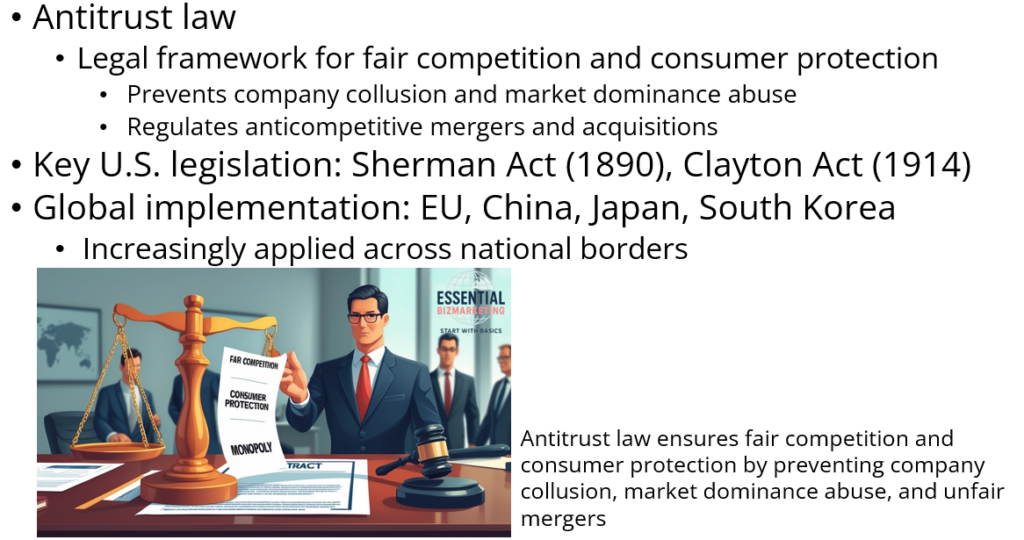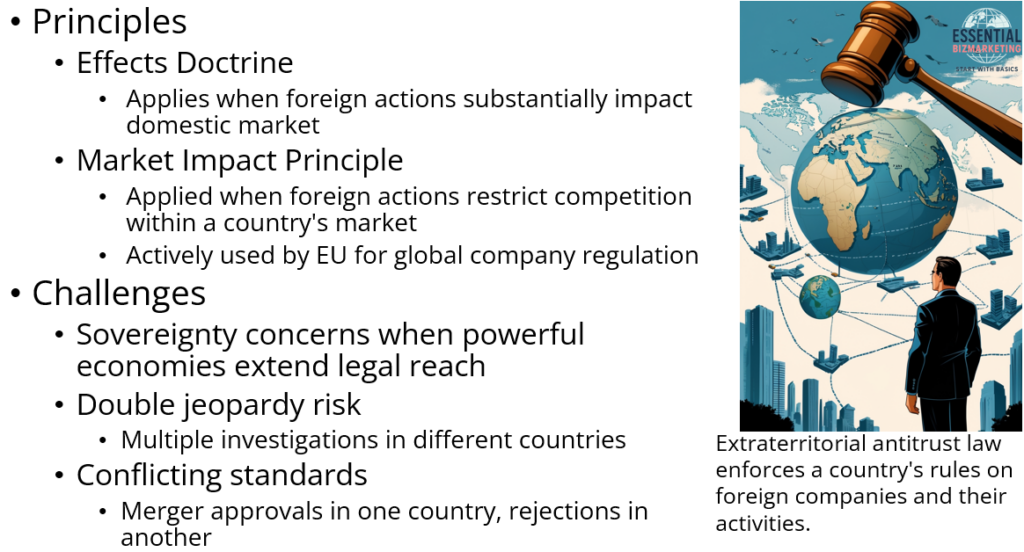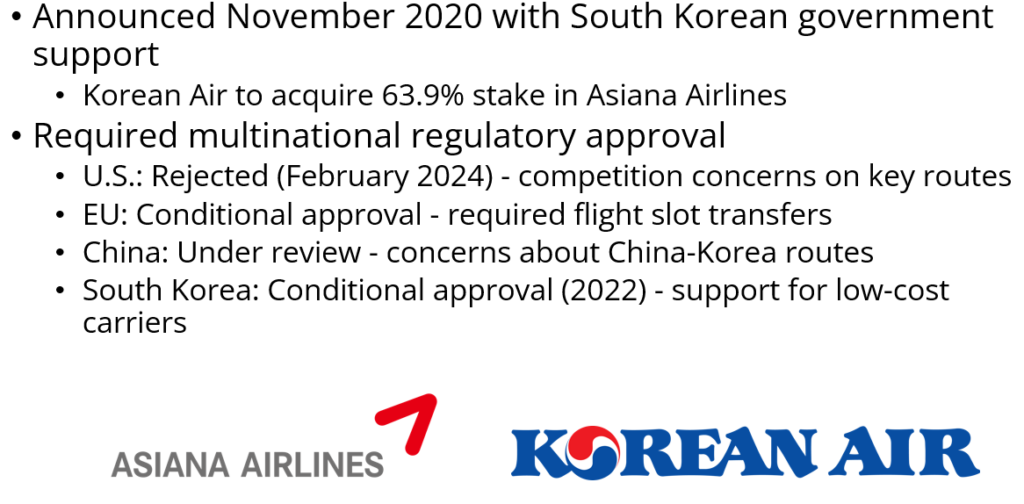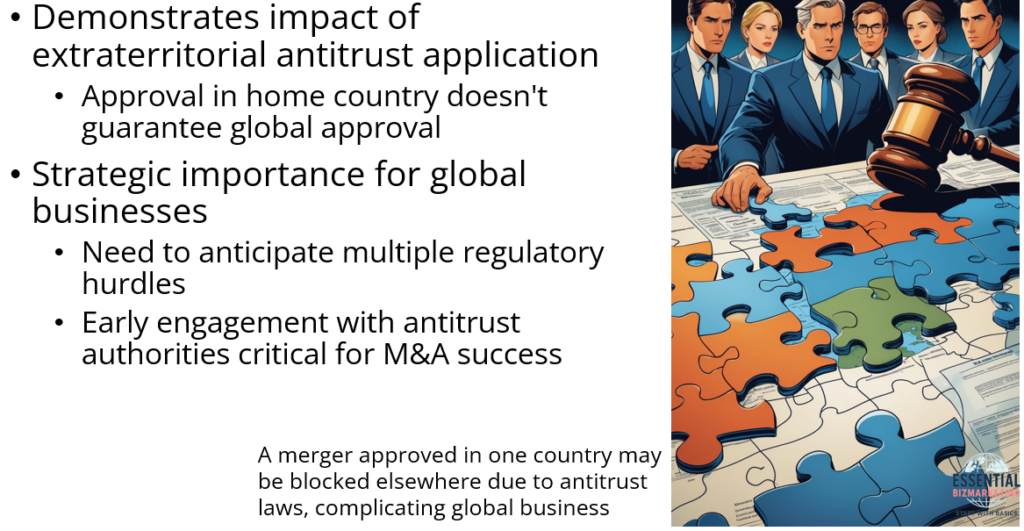What is Antitrust Law?

Antitrust law is a legal framework designed to maintain fair competition in the market and protect consumers. Its primary objectives are to prevent collusion between companies, prevent the abuse of market dominance, and regulate unfair mergers and acquisitions to ensure a free and competitive market environment.
This law was first introduced in the United States in the late 19th century, with key statutes including the Sherman Act (1890), the Clayton Act (1914), and the Federal Trade Commission Act (1914). These laws regulate monopolistic behavior, promote market competition, and prevent anti-competitive corporate mergers.
Not only in the United States but also in the European Union (EU), China, Japan, South Korea, and other countries, different forms of competition laws exist. In today’s global economic environment, national antitrust laws are increasingly being applied beyond borders to regulate foreign companies and overseas economic activities.
Extraterritorial Application of Antitrust Law: Logic, Challenges, and Development

1. The Logic of Extraterritorial Application
The extraterritorial application of antitrust law refers to the enforcement of a country’s antitrust laws beyond its national borders, affecting foreign companies and their economic activities.
Two major principles justify the extraterritorial application of antitrust law.
First, the Effects Doctrine states that even if an anti-competitive act occurs outside a country’s territory, if it has substantial effects on the domestic market, the country’s antitrust law can be applied. For instance, U.S. courts may apply the Sherman Act if a foreign company’s price-fixing or monopolistic behavior negatively impacts U.S. consumers.
Second, the Market Impact Principle asserts that if a company’s mergers or anti-competitive actions abroad restrict competition within a given country’s market, legal sanctions can be imposed. The European Union (EU) actively utilizes this principle to regulate global companies that limit competition within the EU market.
2. Challenges of Extraterritorial Application
The extraterritorial application of antitrust law presents several legal, diplomatic, and economic challenges.
First, it raises concerns about sovereignty infringement. While countries may choose to limit their legal jurisdiction within their borders, powerful economies often extend their legal reach to foreign businesses, which can be perceived as an infringement on another nation’s sovereignty.
Second, the risk of double jeopardy exists. Global companies may face antitrust investigations and penalties in multiple countries simultaneously, creating legal uncertainty and imposing significant burdens on businesses.
Third, differences in antitrust regulatory standards across countries can lead to conflicts. For example, a corporate merger may be approved in one country but considered anti-competitive in another, forcing global businesses to navigate complex and often conflicting regulatory environments.
3. Development and Responses to Extraterritorial Application
To mitigate these challenges, international cooperation in antitrust enforcement is gradually increasing. Organizations such as the OECD (Organisation for Economic Co-operation and Development) and the ICN (International Competition Network) facilitate collaboration among antitrust authorities, aiming to coordinate enforcement measures across jurisdictions. Moreover, businesses are taking proactive steps to reduce legal uncertainties by engaging with key regulatory authorities, conducting legal assessments in advance, and adjusting their merger and market entry strategies accordingly.
The Korean Air–Asiana Airlines Merger Case

1. Background of the Merger
The merger between Korean Air and Asiana Airlines was announced in November 2020 under the support of the South Korean government. The COVID-19 pandemic had severely impacted the airline industry, and to maintain competitiveness, the merger was proposed to enhance global competitiveness and restructure the domestic aviation industry.
Korean Air aimed to acquire a 63.9% stake in Asiana Airlines, establishing a single national flag carrier. However, the merger required regulatory approval from multiple countries, facing significant challenges from the antitrust authorities in the United States and the European Union (EU).
2. Antitrust Regulation by the U.S. and the EU
The U.S. Department of Justice (DOJ) decided in February 2024 not to approve the merger between Korean Air and Asiana Airlines. The DOJ argued that the two airlines had been major competitors on key routes between the United States and South Korea, and their merger would reduce competition, limit consumer choices, and potentially lead to higher airfares. The Los Angeles (LAX)-Seoul (ICN) and New York (JFK)-Seoul (ICN) routes were of particular concern.
Similarly, the European Union (EU) raised concerns about competition restrictions on South Korea-Europe routes and conducted a thorough review. The European Commission (EC) determined that the merger could significantly reduce competition on these routes. In response, Korean Air proposed measures such as transferring some flight slots to competitors. In February 2024, the EU conditionally approved the merger, provided that Korean Air ensures fair competition by allowing competitors like Finnair to access its slots.
3. Review Process in China and Other Countries
China’s State Administration for Market Regulation (SAMR) is also reviewing the merger but has yet to make a final decision. The key concern is that the combined airline’s dominance on China-South Korea routes could lead to reduced competition. The Chinese government is evaluating measures to maintain competitive market conditions.
South Korea’s Fair Trade Commission (KFTC) conditionally approved the merger in February 2022, requiring Korean Air to facilitate competition by allowing low-cost carriers (LCCs) such as Air Premia and T’way Air to expand their presence.
4. Implications

The merger between Korean Air and Asiana Airlines exemplifies how the extraterritorial application of antitrust law can significantly impact corporate activities. Even if a merger is approved in one country, it can be blocked or restricted in another due to antitrust regulations, highlighting the complexity of global business operations.
Furthermore, powerful economic entities like the United States and the EU can intervene in foreign mergers if they believe such actions will affect competition in their domestic markets. This underscores the importance for global businesses to anticipate regulatory hurdles and strategically engage with antitrust authorities when pursuing mergers and acquisitions.
📚 References
Foley & Lardner LLP. (2023, March). Prepare for extraterritorial enforcement of U.S. antitrust law. Foley & Lardner LLP. https://www.foley.com/insights/publications/2023/03/prepare-extraterritorial-enforcement-us-antitrust
Federal Trade Commission. (n.d.). Extraterritoriality & antitrust: A perspective on the U.S. experience. Federal Trade Commission. https://www.ftc.gov/system/files/attachments/key-speeches-presentations/extraterritoriality.pdf
Case Western Reserve University School of Law. (n.d.). An introduction to the extraterritorial application of the American antitrust laws. Case Western Reserve Journal of International Law. https://scholarlycommons.law.case.edu/cgi/viewcontent.cgi?article=2034&context=jil
Reuters. (2024, December 12). Korean Air completes Asiana takeover to form one of Asia’s biggest airlines. Reuters. https://www.reuters.com/markets/deals/korean-air-completes-asiana-takeover-form-one-asias-biggest-airlines-2024-12-12/
Jones Day. (2024, February). Korean Air obtains EU antitrust approval of acquisition of Asiana Airlines. Jones Day. https://www.jonesday.com/en/practices/experience/2024/02/korean-air-obtains-eu-antitrust-approval-of-acquisition-of-asiana-airlines
The Wall Street Journal. (2024, February 15). Korean Air acquires controlling stake in rival Asiana, concludes takeover. The Wall Street Journal. https://www.wsj.com/business/airlines/korean-air-acquires-controlling-stake-in-rival-asiana-concludes-takeover-7a0f4e03
📁 Start exploring the Blog
📘 Or learn more About this site
🧵 Or follow along on X (Twitter)
🔎 Looking for sharp perspectives on global trade and markets?
I recommend @GONOGO_Korea as a resource I trust and regularly learn from.
